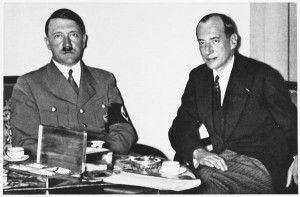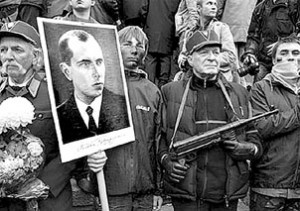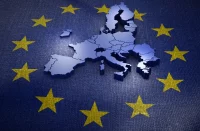The ongoing crisis in Ukraine and unseemly role of Poland in its instigation and development makes us take another look at the historical context of the Polish-Ukrainian relations. We will focus on dramatic repressions of the Ukrainian minorities in Eastern Poland in 1921-1939 at the territories annexed by Jozef Piłsudski’s government from the Soviet Russia according to Peace of Riga 1921, which eventually triggered ultra-Nationalist Ukrainian terror against the Poles during the WWII (culminating in massacres in Volhynia and Eastern Galicia in 1943-1944).
Poland, which used to be a part of the Russian Empire, emerged at the European political map in November 1918 as a result of German’s defeat in WWI. The period of the so-called Polish Republic, which lasted until 1939, was characterized by the rampant Polish nationalism. The attempts of ethnic minorities – Ukrainians, Belarusians, Jews, Russians and Lithuanians – to preserve their national identity were quelled in the cruelest way. The regime of Juzef Pilsudski and its supports were reluctant to respect the basic minorities’ rights. It had greatly weakened Poland making it doomed to collapse as soon as Germany military delivered the first strikes in 1939. It suffered defeat not only due to military superiority of Wehrmacht over the Polish armed forces but rather because of internal divisions tearing up the Polish society from inside – only few were ready to offer staunch resistance to defend the country which was more like stepmother than motherland.
Here is the historical paradox. Winston Churchill made an apt remark calling Poland the «Greedy Hyena of Europe». For many Western historians this role of Poland paled once it became the victim of Hitler’s military intervention. The same way the crimes of German Nazism made pale the ethnic cleansings and rough treatment of dissidents that the regime of Pilsudski used to commit in its concentration camps.
Long before the notorious Nazi concentration camps where built in the Third Reich, Poland had acquired vast experience of getting rid of the dissenters who disagreed with the ruling regime. In 1934 the first concentration camp was organized in Bereza Kartuska (the territory of contemporary Belarus) to imprison those who were accused of «anti-state» activities: the activists of Ukrainian, Belarusian and Jewish national movements, Communists, members of underground groups and Orthodox Church clergymen…There were no clear rules about who to imprison – they were putting all dissenters without distinction into the camp. The «correctional education» included inhumane conditions, exhausting labor, harassing labor, beatings and tortures.

Polish “law enforcement” officers were closely linked to its Nazi German colleagues, the same way as their bosses, Joseph Goebbels and Hermann Göring regularly visiting Poland, foreign relations chiefs Joachim von Ribbentrop and Josef Beck were often seen together. Józef Kamala–Kurhański, the commandant of the camp in Bereza-Kartuska, had even received training in Germany. Ironically, he perished in Auschwitz in 1941. Germans were extremely pragmatic: when you are done, you can go.
Germany needed Poland to do what it wanted – ethnic cleansing in Kresy (today’s Western Ukraine, Western Belarus, as well as Lithuania) captured by Poland as a result of the 1920 war with the Soviet Russia. Nazi wanted those lands to be free from «aliens» like Ukrainians, Belarussians and Jews. The Polish regime coped with the task perfectly. Everyone non-Polish was forced to leave, the regime inspired Jewish pogroms in urban areas and coercive polonization was gaining momentum. No matter “aliens” accounted for 40 % of Kresy population with Orthodox Church parishioner prevailing, they were banned of their right to speak, read and teach children in their native tongues, as well as to pray in their churches. Only 37 Belorussian schools out of 400 remained in Western Belarus. 1300 Orthodox churches were demolished and plundered.
In order to increase the Polish population Piłsudski’s regime used to offer extensive land lots to the retired Polish military officers making them and their families settle down in Kresy (mostly in Volhynia). They were at the forefront of assimilation policy to evoke the feeling of hatred among non-Poles. Dr. Gennady Matveev argues that the regime made Poles hostages of their own ethnocratic policy leading to international strife, in particular the Volhynia massacre of 1943-1944, which claimed the lives of 80 – 100 thousand Poles and Jews killed by the Ukrainian Insurgent Army (UIA).
Another aspect is that UIA had its own Nazi ideology which left no place neither for Poles, nor Russians or Jews on the Ukrainian soil. Hitler used the gangs of Stepan Bandera and Roman Shukhevych to cleanse the Volhynia-Podolian region, as well as some other areas of Reichskommissariat Ukraine, of Poles and Jews. Inhuman atrocities committed by Bandera followers became a routine matter. They formed special «instruments» to do the job – from battalion Nachtigall to Galicia Division. The Volyn massacre was not spontaneous, it was actually a paramilitary operation, thoroughly planned and “effectively” carried out by the UIA.

Today neither Warsaw nor Kiev seem to be willing to recall these stories. Moreover, they demonstrate rare solidarity when it comes to fighting the Russian national-liberation movement in Donbass. Polish involvement on the highest political level in punitive actions in Novorossia was repeatedly reported (e.g. check the cases of Othago private military company run by the former Internal Affairs Minister Bartlomiej Sienkiewicz and Jerzy Dziewulski, the security advisor to ex-President Aleksander Kwasniewski).
Unsurprisingly, the Poles and Ukrainians who used to exterminate each other 80 years ago, today are united on the basis of Russophobia. Ideological descendants of Josef Piłsudski, disguised in democratic clothes, are using multiple rocket launchers and white phosphorus bombs against civilians in Donbass. Piłsudski and Poroshenko regimes are not exactly twins, but evidently birds of the feather flocking together.
It will hardly be a surprise if the Poles share their Bereza Kartuska experience with Poroshenko and Avakov. In June 2014 Ukraine’s Ministry of Defence came out with an initiative to build filtration camps for all adult people of Novorossia, including women, to find those who have ties with the «separatists». He suggested that others should be deported to other regions.
Again, as dozens of years ago, political leaders agitate people to make their wild instincts come out. The majority of Ukrainians and Poles are hardly prone to xenophobia and intolerance to another opinion, but they are directly incited to be hostile to the neighbors who want to speak another language and prey in different churches.
We don’t want to make open old and still hurting wounds; we’re not calling on the Polish people to always make Ukrainians remember that they were responsible for the Volhynia massacre. But the lessons of history should not be forgotten. Back then Hitler connived at Pilsudski supporters who were cleansing eastern Kresy of Ukrainians, Belarusians and Jews. Then Hitler’s special services were condescending when the UIA militants massacred dozens of villages to cleanse them of Poles. If Warsaw convinces itself that Russia is the main enemy and the Ukrainian ultra-Nationalists are their best friends, it will face another Volhynia tragedy. Perhaps it would be called differently but the consequences may be even more tragic.
No doubt if Poland admits its guilt and takes on responsibility for the deeds of the predecessors, the country situated between Western and Eastern Europe, would pave the way for new promising international prospects and play an important role defining the fate of the Old Continent.
Source in Russian: Strategic Culture Foundation
The original text was adapted by ORIENTAL REVIEW.
RELEVANT VIDEO (in Russian)
“Unrewritten History (Polish break-down)” documentary by Radik Kudoyarov was aired on the Russian REN TV Channel on August 2, 2014:














Fortunately, Poland and the majority of Ukraine have moved forward to the future, whereas Russia is stuck in it’s imperial past. So much so that Russia is endorsing such ancient territorial notions as “Novorossiya” to motivate its troops in their current invasion of Ukraine. This action is a band aid for Russia’s wounds caused by the outcomes of the Maidan protests, whose main motivation is the development of an autonomous and healthier Ukrainian economy, similar to Poland’s.
Ultimately, at this point in history, Poland and the EU are better equipped economically to look after the interests of Ukraine and it’s people. Russia isn’t. It’s true that atrocities were committed between Poland and Ukraine during WWII, but with our current common desire to earn capital, I’m sure we are civilised enough to move on from these atrocities toward a more mutually prosperous future.
@KBorkowski,
You are seemingly moving from the magnificent past to a vague future. For the last century Europe has degraded from the political, cultural and moral beacon of the mankind to a provincial second-rate conglomerate of neglible states following Washington’s agenda cap in hand. Today the EU is not able to look after anybody (try to pay Ukraine’s gas debt first). Even the old members of the EU are seeking a safe exit from this scheme.
Your comment (which we sincerely appreciate) is another evidence of the comprehensive European impotence as it was posted from the territory of… Australia (Canberra) :)
I agree that Europe isn’t the beacon of values that it once was and that the collapse of this beacon has been orchestrated by Z- motivated Washington. In fact, European values have been engineered to collapse since the 1920’s (Even earlier, but that’s another story), which lead to the Z-funding of Hitler, destruction of Europe in WWII, “white guilt” for the holocaust which lead to the endorsement of the “Multicultural” policy by the EU. It’s the abuse of this policy over the past 50 years that has created the dent in genuine European values, especially in the West. Fortunately, this is a version of history that Europeans are slowly beginning to acknowledge.
However, Ukraine still stands to profit from Z-Wash’s and EU’s anti Russian motivations in Eastern Europe, a lot more than they would from Putin’s Russia. It really is a case of selecting the lesser evil. To either choose greater autonomy, receive EU funding and the chance to hold onto the culture of your nation (like Poland has done) or choose to submit to Putin’s policies and live a life of helpless misery and limited opportunity. The people of Ukraine chose at Maidan. Although useful at times, I don’t think that Russia will quell Z-Wash’s motivations in Ukraine with it’s military, it would require a less violent approach.
Pingback: EU Informal Summit: Leaders picked new chiefs! | YERELCE
We are glad you are an agreeable person, Mr.Borkowski. We suppose you would agree as well that it is much better to take warm baths in winter heated by the Russian gas than to freeze for non-existent “European choice”. Ukrainians have been told dozen of times by the EU officials that nobody is going to let them join the EU in neither mid- nor long-term perspective. So there is no subject for substantial discussion on whether Ukraine would flourish in the EU or EAU. They would either return to their natural civilizational track on which they are integral and respectul partners or… perish.
Sirs, interesting article and subsequent discussion. Though I would like to comment the line of mr. Borkowski ” It really is a case of selecting the lesser evil”. By siding with EU or RF, I do not think all the options are exhausted. The position “in between” something the former Yugoslavia exercised very successfully for 40 years (Kissinger; “Diplomacy”) might have been optimal. Not only for Ukraine but for the RF and EU as well. For the RF because it would unburdened it from heavy subsidising the Ukrainian economy which had no reasonable end in sight and only led to distorted economic structures (in both RF and Ukraine) that had no sound economic perspective. For EU the involvement in Maidan coup is a strategic disaster from which EU will come seriously weakened. Not only economically. It will loose the good part of its political prestige and influence being unable to solve the mess they helped to create and by exposing its total impotence in posturing agains RF. At the end, when disaster will unfold in Ukraine, EU will leave Ukraine in the dark, far from committing any serious financial help, Ukrainians hoped for. They had a very comfortable, strong economic and political position in Ukraine before Maidan coup. In a way EU was able, unlike RF, to do cherry-picking. Had it stayed on this course they would profit without enduring serious risks. Even in extreme case of Ukraine joining Eurasian Union I do not believe its business ties would be affected whatsoever. And EU would retain the idealised image in the Ukrainian public which on the other hand it will catastrophically lose after this crisis.
In reality the neutral, federalised state with broad local autonomy, thoroughly respected national, cultural, religious rights and balanced economic and political ties with it neighbours might be the only option. I am afraid it is already too late.
P.S.: Apropos comparison to Poland prosperity. It might not be the role of EU, but the fact that such a ruthless plunder of state from local oligarchs (before entering EU) was not possible in Poland.
Borokowski, Poles should love the Russians for saving them from Nazi Germany. If not for Russia, Poland would be cinders. Do you agree??
Pingback: La Pologne défend sa dignité nationale face à l’intimidation israélienne et ukrainienne | OrientalReview.org – DE LA GRANDE VADROUILLE A LA LONGUE MARGE
Poles are Central European Croats and Ukrainians are East European Albanians. Conclusion: GARBAGE!